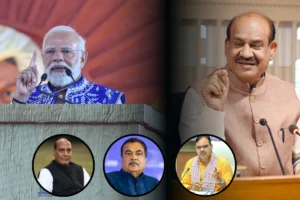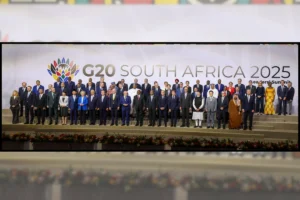
Day 2 of the scientific assessment of the Gyanvapi mosque complex in Varanasi was picked up by a team from the Archaeological assessment of India (ASI) on Saturday. Using ground penetrating radar (GPR) technology, the survey is being conducted. This allows for the non-drilling acquisition of information about metal and other structures up to a depth of 10 meters. According to Mumtaz Ahmad, one of the Anjuman Committee’s attorneys, the Muslim side is prepared to endorse the survey.
Ground penetrating radar to be used
Ground penetrating radar (GPR) technology will be used by a team of specialists from the Indian Institute of Technology (IIT-K) to conduct a scientific investigation of the Gyanvapi mosque compound in Varanasi while aiding the Archaeological Survey of India (ASI).
The chairman of the IIT-K’s Earth Sciences department, Professor Javed N. Malik, who is in charge of the technical team, stated that the institute has a capable group of scientists and engineers for the GPR research.
“Last month, the ASI contacted IIT-K. All the equipment needed for testing is here. These findings can be made without harming anything or demolishing anything, added Malik.
Prof. Malik is a well-known researcher who has taken part in various significant archaeological research projects across the country.
Malik claims that “the ground penetrating radar is such a technology that can identify concrete, metal, pipe, cable or other objects buried underneath any object without damaging or dismantling it.”
“In this, signals generated by electromagnetic pulses with frequencies of 10 MHz and 2.6 MHz are employed to produce signals that can show the internal composition of any object with a depth of eight to ten meters. He went on to say that it is possible to find the metal or other substance hidden inside even a huge rock “even before 2D and 3D profiling is done.”
Malik continued, “Electromagnetic rays are introduced to the object or location that is to be investigated during the use of this technique, and the conclusion is drawn by analyzing the returning rays and sound frequencies.” He stated, “The GPR preliminary findings will come initially, but the entire survey may take seven to eight days.”
Findings in the premises

In order to ascertain whether the Gyanvapi Mosque in Varanasi was built over a Hindu temple, the Archeological Survey of India (ASI) continued its investigation of the structure on Friday. A trident (trishul), swastika, bell, and flower-like symbol etched on the walls and pillars of the Gyanvapi complex were the subject of videography and photographs by the top archeological organization.
The first day was spent surveying the symbols on the walls, domes, and pillars.
The survey included the formations carved on the disputed structure’s domes and pillars and recorded the building method and age of each design. The district authorities sent out a huge number of security guards to maintain peace and order close to the Gyanvapi complex.
The survey took place on the first day for roughly seven hours, during which time the ASI took pictures of the structures’ designs. The depth and height of various elements of the Gyanvapi complex were measured, and dial test indicators were positioned on each of the structure’s four corners.
The ASI team had 37 members; when joined with the IIT expert teams, a total of 41 people made up the team, which was split into four teams to begin this survey.
On Saturday, the survey started up again and the Muslim side said they would participate. Today’s survey started at 9 am and will last till 12.30 pm. It will begin again at 2:30 pm and will go on till 5 pm
Also read: ‘Ram Lala’ Consecration Ceremony In Ayodhya, To Be Held In Third Week Of January
Idols are predicted to be discovered
“Yesterday, videography was done by the ASI. There are chances that the survey of underground places (tehkhana) may be carried out today. One can see various symbols on the structure. Through Ground Penetrating Radar (GPR), all the idols that were submerged inside may be discovered,” one of the petitioners quoted
“The survey will begin on Saturday at 9 a.m. For us, yesterday was a significant day of celebration. The poll will now go on. Today, the Muslim side will work with us, she remarked.
The ASI was given an additional four weeks by a Varanasi court on Friday to finish the scientific study of the Gyanvapi mosque, which is near to the Kashi Vishwanath temple.
The nation’s top archaeology organization should survey the Gyanvapi mosque, according to the Supreme Court, which stated on Friday that a “non-invasive method” should be used.The district court’s survey ruling had been contested by the mosque committee before the Allahabad High Court.
Also read : India’s Heartbeat Races As Chandrayaan 3 Is To Enter Moon’s Orbit Today!
The mosque committee sought to overturn the district court’s decision to allow the ASI to carry out the investigation to determine whether the mosque was built on top of a previous temple, but the high court on Thursday rejected their appeal.
The Gyanvapi mosque gained notoriety after some women claimed there had once been a temple there and went to a Varanasi court to request permission from a Hindu god to pray at the mosque daily.
The court then mandated a video inspection of the plant in 2022 based on this petition. During the survey, a structure that the petitioners claimed was a “shivling” was discovered.
The mosque management committee insisted that the building belonged in the wazukhana, a room filled with water where worshipers wash their hands and feet before worshipping.
Due to the sensitive nature of the case, the Supreme Court ordered that the alleged “shivling” location be sealed. In September 2022, the Varanasi District Court denied the mosque committee’s appeal. They said that it wasn’t justified for the women to want to worship Hindu gods inside the complex’s grounds.
To read more such news, download Bharat Express news apps























